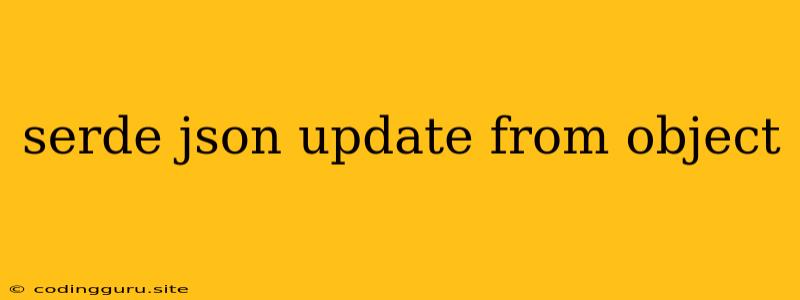How to Update a JSON String from an Object in Rust Using serde_json
Rust's serde_json library offers a powerful and efficient way to work with JSON data. You might encounter situations where you need to update a JSON string with data from a Rust object. This article will guide you through how to achieve this using serde_json.
Understanding the Problem
Imagine you have a JSON string representing a user object:
{
"name": "John Doe",
"age": 30,
"occupation": "Software Engineer"
}
Now, you have a Rust struct that reflects this user object:
#[derive(Serialize, Deserialize)]
struct User {
name: String,
age: u32,
occupation: String
}
You want to update the age of the user in the JSON string using a modified User object.
The Solution: Deserializing, Updating, and Reserializing
Here's the process for updating a JSON string using a Rust object:
- Deserialization: Deserialize the JSON string into a Rust object using serde_json's
from_strfunction. - Updating the Object: Modify the relevant fields in the Rust object.
- Reserialization: Serialize the updated Rust object back into a JSON string using serde_json's
to_stringfunction.
Code Example:
use serde::{Deserialize, Serialize};
use serde_json::{from_str, to_string};
#[derive(Serialize, Deserialize)]
struct User {
name: String,
age: u32,
occupation: String
}
fn main() {
let json_str = r#"{"name": "John Doe", "age": 30, "occupation": "Software Engineer"}"#;
// 1. Deserialize the JSON string into a User object
let mut user: User = from_str(json_str).unwrap();
// 2. Update the object
user.age = 31;
// 3. Reserialize the updated object into a JSON string
let updated_json_str = to_string(&user).unwrap();
println!("Updated JSON String: {}", updated_json_str);
}
Output:
{"name":"John Doe","age":31,"occupation":"Software Engineer"}
Tips for Efficient Updating
-
Partial Updates: If you only need to update specific fields, you can use the
serde_json::Valuetype. This allows you to access and modify individual parts of the JSON structure without completely deserializing and reserializing the entire object. -
Custom Deserializers: For complex scenarios, you can define custom deserializers using the
Deserializetrait. This gives you more control over how JSON data is mapped to your Rust structures. -
Performance: Consider using a faster serialization library like
bincodeorrmp-serdeif performance is a critical factor and you don't require the JSON format.
Conclusion
Using serde_json, updating a JSON string from a Rust object is a straightforward process. By understanding the deserialization, modification, and re-serialization steps, you can effectively manage JSON data within your Rust applications. Remember to choose the most appropriate technique based on your specific update requirements and performance considerations.
